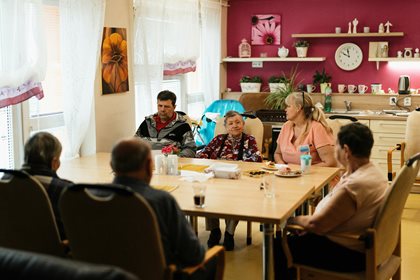Archive
-
2025
-
2024
-
2023
-
2022
-
2021
-
2020
-
2019
-
2018
-
2016
-
2013
Category
Effective Chronic Disease Interventions in Nursing Homes: A Scoping Review Based on the Knowledge-to-Action Framework
The purpose of this scoping review was two-fold: 1) to identify effective intervention studies addressing chronic disease for seniors living in nursing homes (e.x. chronic heart failure, diabetes, dementia, etc.), and 2) to describe how consistently the studies’ reported their stages of the Knowledge-to-Action framework (2006).
Improving clinical care outcomes for Canadian seniors: findings of a pilot study evaluating an applied simulated and integrated learning approach (ASILA) for home care workers
Home care workers deliver care services to community-dwelling seniors across Canada, but home care workers’ variable education and unfamiliarity with assessment data systems can impede client-centered care. This pilot study therefore examined the effectiveness and feasibility of five educational modules on geriatric care, developed with a pedagogical framework used to educate and empower home care workers, in improving care beliefs and attitudes, care provision challenges, and satisfaction with modules.
Profiling the Characteristics of People Who Are Comatose in Long-term and Complex Continuing Care Settings
To describe the sociodemographic, clinical, and treatment characteristics of people who are comatose in Canadian complex continuing care (CCC) and long-term care (LTC) settings, and to make recommendations to promote comprehensive care planning for this population.
Shared learning environments for unregulated care provider education in long-term care: Innovative approaches and key considerations
Long-term care (LTC) or nursing homes often experience difficulty recruiting passionate, competent and confident graduates to add to their teams. Few graduates are well-prepared for working in LTC environments and they do not often stay long. In an effort to strengthen the LTC workforce, we established a collaboration with a LTC and retirement living organization and a community college to develop a Living Classroom. In this novel approach, college students attend an accredited LTC home for all learning.
Psychometric evaluation of the team member perspectives of person-centered care survey for long-term care homes
Patient-centered care (PCC) is fundamental for providing high quality care in long-term care homes. This study aimed to evaluate the psychometric properties of an 11-item Team Member Perspectives of Person-Centered Care (TM-PCC) survey, adapted from White and colleagues (2008). In a cross-sectional study, 461 staff from four long-term care homes in Ontario, Canada completed the TM-PCC. Construct validity and reliability of the TM-PCC were examined with a principal component analysis and Cronbach’s alpha coefficient.






